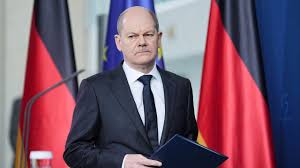In a decisive stance on Germany’s role in the ongoing Middle East conflict, Chancellor Olaf Scholz has reaffirmed the country’s commitment to supplying weapons to Israel. This declaration comes against a backdrop of criticism and debate surrounding Germany’s arms export policies. The chancellor’s statement underscores the intricate balance between supporting allies and navigating the complexities of international conflicts. As weapon supplies continue to play a crucial role in shaping the geopolitical landscape, Germany’s position reflects the broader challenges facing nations in their approach to regional stability and security.
The Bundestag Debate and Political Divisions
The German Bundestag recently witnessed a heated debate centered on the October 7, 2023 attack by Hamas and the subsequent Israeli response. Chancellor Scholz used this platform to address concerns about Germany’s support for Israel, stating emphatically, “We have supplied weapons and we will supply weapons. … We have made decisions in the government that will also ensure that there will be further deliveries in the near future.”
This declaration came in response to criticism from the main opposition Christian Democrats, led by Friedrich Merz. The opposition accused the coalition government of Social Democrats, Greens, and Free German Party of insufficient support for Israel. Merz pointed to alleged delays in processing export licenses for ammunition and spare parts for tanks, suggesting a de facto denial of these permits.
The debate highlighted the political divisions within Germany regarding its approach to the Israel-Palestine conflict. While the ruling coalition defended its stance, the opposition pushed for more robust support for Israel. This internal disagreement reflects the broader challenges faced by Western nations in formulating coherent policies towards the complex and volatile situation in the Middle East.
Scrutiny of Arms Export Policies
Germany’s arms export policies have come under intense scrutiny in recent months. According to information from the Federal Economic Affairs and Climate Action Ministry, the government had not approved any war weapons exports to Israel between March and August. This revelation came in response to inquiries from the left-wing Bundnis Sahra Wagenknecht (BSW) party.
The German regulatory framework distinguishes between “war weapons” and “military equipment,” with the former subject to stricter controls. This nuanced approach to arms exports reflects Germany’s attempt to balance its support for allies with concerns about escalating conflicts.
Sahra Wagenknecht, leader of the BSW party, has been vocal in her criticism of arms deliveries to Israel. She argues that if the German government wants to credibly advocate for a ceasefire and a two-state solution, it must cease supporting what she terms “Israel’s ruthless warfare” through arms exports. Wagenknecht’s stance represents a significant counterpoint to the government’s position, highlighting the diverse perspectives within German politics on this sensitive issue.
Weapon Supplies and Regional Dynamics
The debate over German weapon supplies to Israel occurs against the backdrop of ongoing Israeli military operations in Gaza and Lebanon. These actions have drawn international attention and criticism, with concerns about civilian casualties and the potential for broader regional destabilization.
Germany’s decision to continue supplying arms to Israel reflects its long-standing commitment to Israel’s security. However, it also raises questions about the role of external powers in regional conflicts and the potential consequences of arms exports on the dynamics of the Israel-Palestine issue.
The situation is further complicated by the broader geopolitical context, including tensions with Iran and the involvement of non-state actors like Hezbollah. As Germany navigates these complex waters, its decisions on arms exports will likely have far-reaching implications for its relationships in the Middle East and its standing on the global stage.
International Reactions and Future Implications
Germany’s stance on weapon supplies to Israel has not gone unnoticed by the international community. While some allies have expressed support for Germany’s commitment, others have raised concerns about the potential for escalation in an already volatile region.
The decision to continue arms exports also has implications for Germany’s broader foreign policy objectives, including its efforts to promote peace and stability in the Middle East. As the situation evolves, Germany may face increasing pressure to reassess its position and consider alternative approaches to supporting regional security.
Chancellor Olaf Scholz’s vow to continue supplying weapons to Israel marks a significant moment in Germany’s engagement with the Middle East conflict. As weapon supplies remain a contentious issue, Germany finds itself at the intersection of historical responsibilities, strategic alliances, and the complex realities of modern geopolitics. The ongoing debate within Germany reflects the broader challenges faced by nations in reconciling support for allies with the pursuit of peace and stability in conflict-ridden regions. As the situation continues to unfold, Germany’s decisions on arms exports will undoubtedly play a crucial role in shaping its foreign policy and its position on the global stage.
Related News
















